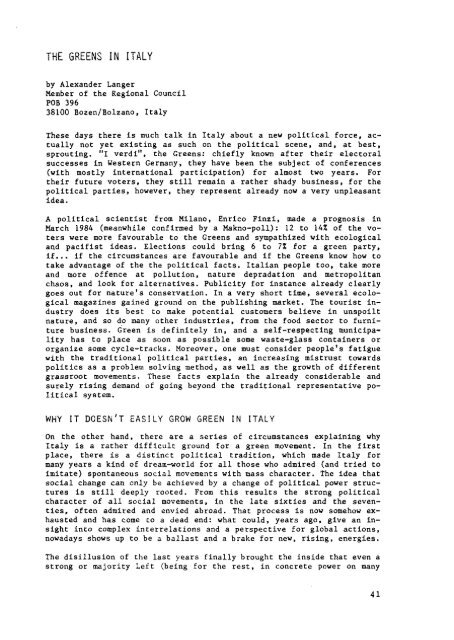Ifda dossier 47, May/June 1985
Ifda dossier 47, May/June 1985
Ifda dossier 47, May/June 1985
Create successful ePaper yourself
Turn your PDF publications into a flip-book with our unique Google optimized e-Paper software.
THE GREENS IN ITALY<br />
by Alexander Langer<br />
Member of the Regional Council<br />
FOB 396<br />
38100 BozenIBolzano, Italy<br />
These days there is much talk in Italy about a new political force, ac-<br />
tually not yet existing as such on the political scene, and, at best,<br />
sprouting. "I verdi", the Greens: chiefly known after their electoral<br />
successes in Western Germany, they have been the subject of conferences<br />
(with mostly international participation) for almost two years. For<br />
their future voters, they still remain a rather shady business, for the<br />
political parties, however, they represent already now a very unpleasant<br />
idea.<br />
A political scientist from Milano, Enrico Finzi, made a prognosis in<br />
March 1984 (meanwhile confirmed by a Makno-poll): 12 to 14% of the vo-<br />
ters were more favourable to the Greens and sympathized with ecological<br />
and pacifist ideas. Elections could bring 6 to 7% for a green party,<br />
if.. . if the circumstances are favourable and if the Greens know how to<br />
take advantage of the the political facts. Italian people too, take more<br />
and more offence at pollution, nature depradation and metropolitan<br />
chaos, and look for alternatives. Publicity for instance already clearly<br />
goes out for nature's conservation. In a very short time, several ecolo-<br />
gical magazines gained ground on the publishing market. The tourist in-<br />
dustry does its best to make potential customers believe in unspoilt<br />
nature, and so do many other industries, from the food sector to furni-<br />
ture business. Green is definitely in, and a self-respecting municipa-<br />
lity has to place as soon as possible some waste-glass containers or<br />
organize some cycle-tracks. Moreover, one must consider people's fatigue<br />
with the traditional political parties, an increasing mistrust towards<br />
politics as a problem solving method, as well as the growth of different<br />
grassroot movements. These facts explain the already considerable and<br />
surely rising demand of going beyond the traditional representative po-<br />
litical system.<br />
WHY IT DOESN'T EASILY GROW GREEN IN ITALY<br />
On the other hand, there are a series of circumstances explaining why<br />
Italy is a rather difficult ground for a green movement. In the first<br />
place, there is a distinct political tradition, which made Italy for<br />
many years a kind of dream-world for all those who admired (and tried to<br />
imitate) spontaneous social movements with mass character. The idea that<br />
social change can only be achieved by a change of political power struc-<br />
tures is still deeply rooted. From this results the strong political<br />
character of all social movements, in the late sixties and the seven-<br />
ties, often admired and envied abroad. That process is now somehow ex-<br />
hausted and has come to a dead end: what could, years ago, give an in-<br />
sight into complex interrelations and a perspective for global actions,<br />
nowadays shows up to be a ballast and a brake for new, rising, energies.<br />
The disillusion of the last years finally brought the inside that even a<br />
strong or majority Left (being for the rest, in concrete power on many
















